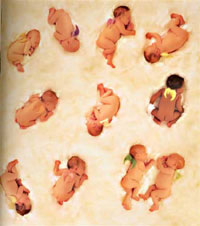“金猪宝宝”潮来 医院大夫绷紧弦
Baby boom may put strain on Chinese hospitals
To prevent a medical shortage caused by the high number of births expected in the auspicious Year of the (Golden) Pig, Beijing's health authority has suggested expectant mothers steer clear of the top hospitals to avoid overloading them. Xiao said the city currently has 3,800 beds and 3,000 medical workers available in its 170 obstetrics departments and hospitals. "The difficulty is that many pregnant women only choose a few top hospitals to have physical checks and deliver, while the other hospitals have beds available," Xiao was quoted by the Beijing Times as saying. Xiao said the auspicious Year of the (Golden) Pig had fueled the birth rate this year, and Beijing expected a total of 150,000 babies to be born in 2007, compared with 129,000 in 2006. The lunar calendar designates one of 12 zodiac signs to each year. The years also rotate through five elements gold, wood, water, fire and earth. In 2007, the Year of the Pig coincides with the element of gold. It is said children born in this year are blessed with a carefree life. This notion has sparked a baby boom across the country. The baby boom has already put hospitals and doctors on alert in major cities. The delivery rooms in major hospitals in Shanghai have been fully booked until March, although some are squeezing up to six expectant mothers into a room designed for four, and will cut short the hospitalization period . Experts warned that irrational family planning would result in a shortage of social resources. Given China's large population, selective birth in so-called lucky years may worsen the existing shortage of social resources, including education and employment. 为了防止金猪吉年大量婴儿出生造成医疗资源短缺,北京卫生局日前建议,孕妇们不要只考虑那些大医院,以免造成这些医院负担过重。 据北京卫生局妇幼处处长肖珣介绍,按照目前的出生率,北京市并不存在产科资源紧缺的问题。 肖部长说,目前北京各医院的170个产科共有3800个床位和3000名医护人员。 《京华时报》援引肖处长的话说:“主要问题在于,很多孕妇只去那几家好医院进行孕检和分娩,而其他医院则出现床位闲置的现象。” 肖处长说, “金猪年”一说导致今年的生育率明显增长,北京今年预计将迎来15万个“猪宝宝”,而去年的这一数字则为12万9千人。 按阴历的说法,每年都是十二属相中的一个“生肖年”。此外,各年份还围绕着“金、木、水、火、土”五大元素交替轮换。 2007年是猪年,恰巧又逢五行中的“金”,所以就构成了“金猪年”。据说在这一年出生的孩子会很有福气。 因此,“金猪年”的说法引起了全国范围内的“宝宝潮”。 在一些大城市,这一生育高潮已经让很多医院和大夫绷紧了弦。 上海几个大医院的分娩室三月份的床位已经被订满,有些医院将原来的四人房"挤"为六人房,此外,医院还将缩短产妇的住院期。 专家警告,缺乏理性的生育计划会导致社会资源紧缺。 中国人口众多,选在所谓的‘幸运年’生孩子将会进一步加剧教育、就业等社会资源的紧缺问题。 |
- 上一篇

- 下一篇




 手机网站
手机网站